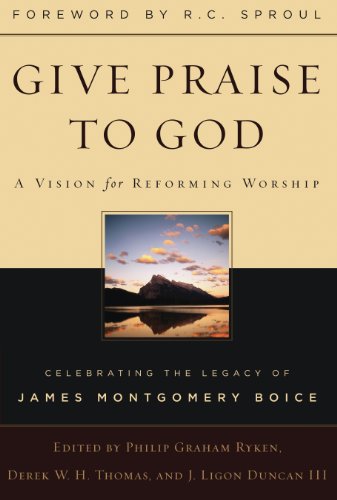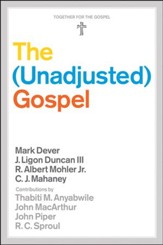
Quotes by Ligon Duncan
[Jesus is] not saying, “Take absolutely no oaths at all,” because Jesus Himself took and made oaths. You remember what Jesus said to His disciples in the upper room in John 13? “I tell you I will never again eat of this meal until we eat it in the Kingdom.” He was making an oath. He was saying, “I’m never going to sit down with you and eat this supper until we are eating the marriage feast of the Lamb together.” It was a pledge to His people – that He was going to be faithful until He brought them to glory. Paul made oaths. So Jesus’ point is not, “Don’t ever make oaths.” His point is, “Don’t ever use God’s name in an oath with subterfuge.” You always tell the truth. And even if you don’t invoke God’s name, whenever you are being called upon to tell you are witnessing as to whether you are from God or from the evil one.
“No False Testimony”, First Presbyterian Church, Jackson, MS. As downloaded in Fall of 2010, URL: http://www.fpcjackson.org/resources/sermons/exodus/Exodus%20Vol%203%20&%204/26bExo.htm. Used by Permission.
Public worship occurs when the people of God assemble for the express purpose of giving to the Lord the glory due His name and enjoying the joy of His promised special presence with His own people.
God shows us the importance of the commandment [to honor our parents in Exodus 20] in several different ways:
1. First of all, notice that He puts it first in the list of our horizontal responsibilities. Our vertical responsibilities are addressed in commands one through four to Him, but when He begins to express our horizontal responsibilities, our responsibilities in our human relations with one another, the very first thing He says is, “Honor your father and your mother.”
2. Secondly, it is interesting. If we were to go ahead and read the laws all the way up through Exodus 24, you would find that God attaches the same penalty to disobedience of parents that He attaches to blasphemy and idolatry and the worship of false gods. In both cases, blasphemy and idolatry, worship of false gods, and in the case of disobedience to parents, in the laws of Moses the death penalty is given.
3. Thirdly, notice that this command flows out of and is closely connected to what is said in the first four commands. The first four commands basically said, “Worship God only. Revere God only.” And then the fifth commandment, what is the first word out of God’s mouth to us about our parents? “Revere your parents.” Isn’t it fascinating that He could spend four commands, and especially the first two commands, claiming to Himself the exclusive right to our reverence, to our worship, and to our adoration. And then in the very first word out of His mouth to us in how we relate to one another, He can say, “Revere your father and mother.”
“Honor Parental Authority”, First Presbyterian Church, Jackson, MS. As downloaded in Fall of 2010, URL: http://www.fpcjackson.org/resources/sermons/exodus/Exodus%20Vol%203%20&%204/24bExo.htm. Used by Permission.
To take up God’s name in vain means any frivolous, or insincere, or thoughtless, or unsubstantial use of His name. It might mean irreverent humor which mocks God in speech, or mocks others with His name. It might be blasphemy or cursing or a broken oath, but it means more than that. It could mean professing faith in Christ, and claiming to be a Christian, and receiving baptism, and yet walking in worldliness.
“The Scarlet Letter”, First Presbyterian Church, Jackson, MS. As downloaded in Fall of 2010, URL: http://www.fpcjackson.org/resources/sermons/exodus/Exodus%20Vol%203%20&%204/25bExo.htm. Used by Permission.
They may seem weak in the eyes of the worldly strong. They may seem foolish in the eyes of the worldly wise. But the Gospel message is the power of God unto salvation, and the Gospel means are effectual to salvation. These are the Spiritual instruments given by God with which Christian congregational Spiritual life is nurtured, the Spirit’s tools of grace and growth in grace appointed by God in the Bible.
The Ordinary Means of Growth, Tabletalk, October 2007, p. 14. Used by Permission of Ligonier Ministries.
What will a church look like that is committed to the ordinary means of grace? It will be characterized by love for expository preaching, passion for worship, delight in truth, embrace of the Gospel, the Spirit’s work of conversion, a life of godliness; robust family religion; biblical evangelism; biblical discipleship, biblical church membership, mutual accountability in the church, biblical church leadership, and a desire to be a blessing to the nations. Along with this all, there will be an unapologetic, humble, and joyful celebration of the transcendent sovereignty of the one, true, triune God in salvation and all things.
The Ordinary Means of Growth, Tabletalk, October 2007, p. 15. Used by Permission of Ligonier Ministries.
Family Worship is led by fathers, or other heads of families, with a view to establishing God-centered homes, promoting worship in all of life in all the members of the household, and in preparation for public worship. The Bible makes clear the importance of family worship (Ex. 12:3; Dt. 6:6-8; Jos. 24:15).
Expository preaching is the faithful explanation and application of the Bible in which the text of Scripture supplies the matter of the preacher’s exhortations rather than the preacher using the text as an occasion for his own expostulations, however helpful they may be.
There are two ways to commit idolatry. You can worship something other than the one true God, that’s way one. There is another way as well. You can worship the one true God by some other means than those that He has appointed.
“No Idols”, First Presbyterian Church, Jackson, MS. As downloaded in Fall of 2010, URL: http://www.fpcjackson.org/resources/sermons/exodus/Exodus%20Vol%203%20&%204/23aExo.htm. Used by Permission.
If your clothing is provocative, even though it may be your heart’s desire to remain pure for your spouse, you are sending the message to men, to boys, that you are ready for that sexual activity now. You’re sending a conflicting message and you’re making it hard for your brother to remain pure. When your clothing draws attention through its tightness, or through the flesh that it reveals, away from your face, where you could be treated as a person of intelligence and dignity, and to those parts of your body which have sexual functions, you are asking for trouble and you are causing your brother to stumble… Do we want our wives and our daughters to be looked upon as sex objects for the gratification of other men?
“The Scarlet Letter”, First Presbyterian Church, Jackson, MS. As downloaded in Fall of 2010, www.fpcjackson.org/resources/sermons/exodus/Exodus%20Vol%203%20&%204/25bExo.htm. Used by Permission.



